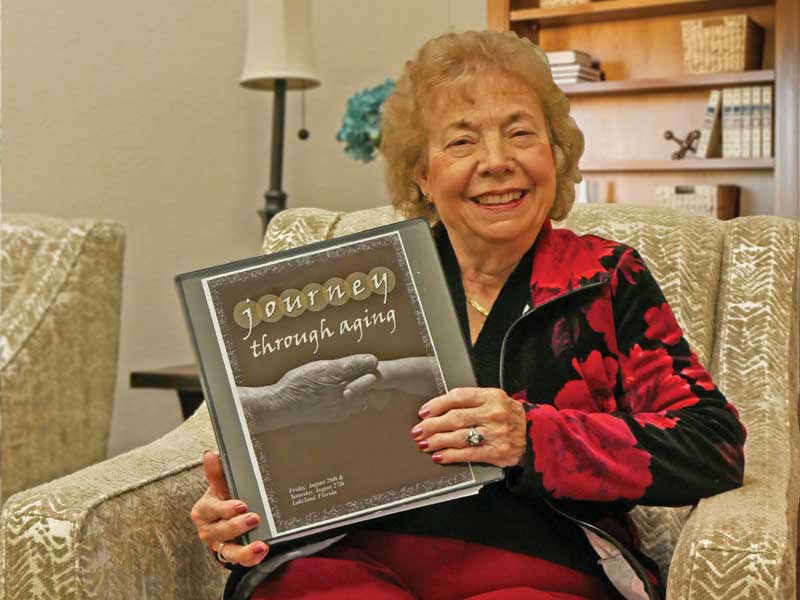by TIM CRAIG
A chat with Health Hero Dr. Rosemarie Lamm is a lesson in history, a call to service, and
a kick of inspiration.
Dr. Lamm, the director of the Rath ConNEXTions Center in Lakeland, is eager to share what she’s learned and equally eager to learn what others share. This quest for sharing knowledge is what has helped the Rath ConNEXTions Center build a program for seniors that is the only one of its kind in the state of Florida.
“We have developed in two specific areas,” she says, “first, we work at making people aware of the services they have in our community and second we work at providing continuing education for the adult learner. Both of these efforts have been very successful.”
Lamm and her husband moved from Buffalo, N.Y. to Lakeland in 1972. He is a surgeon and she became a nurse practitioner. She received an MSN and a Ph.D. from the University of South Florida, and began teaching there in 2001. During her time at USF, she was named the Founding Director of the Rath ConNEXTions Center.
“When we started in 2003, I was focusing part of my teaching and research in the area of gerontology,” she says. “Through that research, we felt the need to connect seniors with services in the area.”
Lamm first met Alfred Rath in 1975 when he hired her at the Peace River Center. Rath was a clinical social worker and wrote grants for various social agencies in the area. The two remained in touch and as she was teaching and doing research, he approached her again.
“He asked me if I would take the efforts that he had been working on and do something with it,” she says. “It really took off.”
When Rath passed away in 2005, he had set up a foundation to help continue the work of the ConNEXTions Center. Lamm brought together the Center’s Board of Trustees and turned the Rath Center into a nonprofit.
“We all wanted to carry on the work of helping seniors and their families participate in the lifelong learning process,” says Lamm.
If it seems that lifelong learning is a theme for Dr. Lamm, that’s because it is. From the beginning, Lamm saw a great need in the community for seniors to be connected with local services.
“There are a lot of adjustments that come with aging, and they aren’t all negative or related to loss,” she says. “There’s the adjustment of retirement, or relocating to a new area, or figuring out what you’re going to do with all your time. There are a myriad of challenges all across the spectrum as people enter retirement.”
As she moved into her doctorate work in medical anthropology — again, lifelong learning — she saw the need to collect data on these trends she had observed in her work. By blending the data with the observations and anecdotes, Lamm was able to validate the trends that were affecting not only the individual, but also the community and culture around it.
“We look at the human factors that underlie the medical science,” she says. “We can study an illness, and look at the human elements that are involved. Then we can integrate the larger culture into these threads, we can begin to measure what works best.”
This methodological approach has helped fuel the center’s ability to change and adapt as its target audience has changed. Lamm says that the senior population has grown in her years in Lakeland, from roughly 17 percent when she started collecting date at the turn of the century to 23 to 24 percent today. This larger population is also becoming increasingly educated. When the center first started, the average highest level of education was eighth grade to high school. Now, says Lamm, there’s a greater increase in two-year and four-year degrees.
This presents challenges for the Rath Center, especially with the senior scholar classes. Instead of basic computer skills, classes now focus on laptop and tablet training, as well as how to get the most out of social media sites like Facebook and Instagram. The most popular class this semester? Conversational Italian.
“It’s a double-edged sword,” says Lamm. “We have a healthier population, they’re living longer, but they also have more chronic illnesses, like arthritis and cancers. We have a large part of our population in post-stroke groups and different types of support groups that are vital to not only the person, but also the caregiver.”
This is where the partnerships that Lamm and the Rath Center have developed over the years comes in handy. And it is these partnerships, together with the educational possibilities for an ever-changing target audience that keeps Lamm motivated.
“I still do it because there remains a need in this community. I hear a lot of great things from people and it is so rewarding, but there is still a great need,” she says. “I also strive to look for others who can continue the work. The more people come, the more ideas we’re exposed to, and these ideas are what keeps us growing in our mission.”
